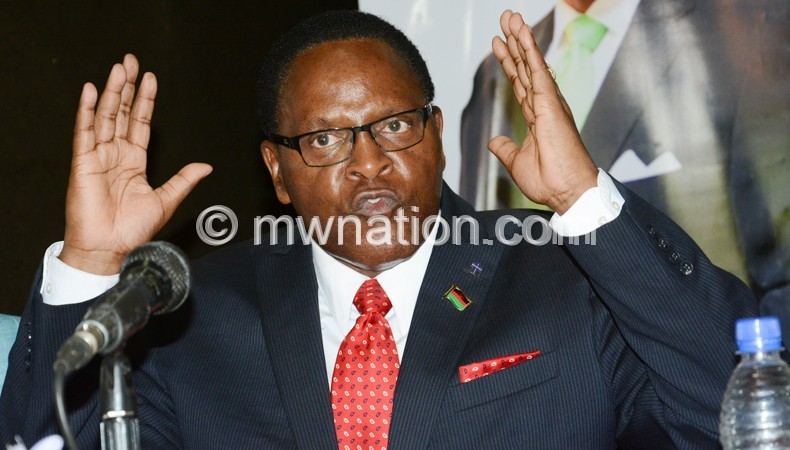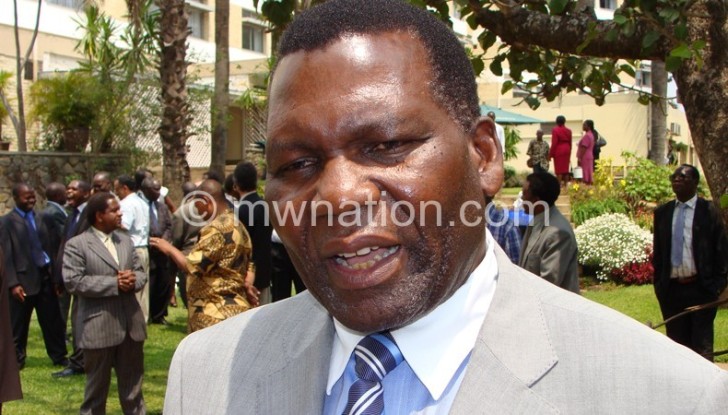Opposition takes tough stand on Bill
- It is unfair to reject a K74bn grant without basis, says Chaponda
Leader of Opposition Lazarus Chakwera has declared that any grant or Bill that the government will table in the National Assembly, but with scanty details about how ordinary citizens may benefit, will be rejected with impunity by opposition members of Parliament (MPs).
He was speaking to Nation on Sunday in Lilongwe on Friday, a few hours after MPs, mainly from the opposition side, rejected a Bill meant to authorise the government to get a grant of about K74 billion ($1.4 million) from the International Development Association (IDA).

The proposed Bill was aimed at authorising Minister of Finance, Economic Planning and Development Goodall Gondwe, on behalf of Malawi Government, to enter into an agreement with the IDA for the financing of the Malawi Drought Recovery and Resilience Project (MDRRP).
But in a voice vote, the opposition rejected the Bill at its second reading of the committee stage, mainly because it was said to lack specifics and proof that ordinary people would benefit from the projects facilitated by the grant.
“We do not want another Cashgate style of doing things,” Chakwera, who is also president of the main opposition Malawi Congress Party (MCP) and Lilongwe North West MP, said.

He was referring to the way some politicians and civil servants used corrupt and fraudulent tricks, including manipulating figures and hiding the haemorrhage to systematically loot the government coffers of about K24 billion in months, in a scandal exposed in 2013.
Enthused Chakwera: “You could even tell from the minister [Finance, Economic Development and Planning Minister Goodall Gondwe in Parliament] that we still have issues with procurement and he agreed with our observation. So, you cannot have money just given as a grant like that, and you don’t even specify what you want to do with it, except in generalities.”
He bashed government’s tendency to ‘ambush’ MPs by short-circuiting Standing Orders that demand that debate on key Bills should precede 28 days of notice, to enable the MPs to study the issues adequately.

“We are tired of this. We want to be sure that when people [donors] give us [Malawi] grants, ordinary Malawians are the ones who benefit—and not a few folks that are in charge somewhere,” Chakwera stressed.
He dared the government to bring back the Bill tomorrow, but insisted that the ruling Democratic Progressive Party (DPP) bloc must be prepared to offer convincing explanations on actual projects, beneficiaries and the national equity of the projects.
Chakwera seemed surprised that the government side easily capitulated in a voice vote on the grant Bill. But when it was hinted to him that most of the DPP officials, by voting time, were heading to the Southern Region to be part of at least two of President Peter Mutharika’s public events, he was even more surprised.
“I was invited to those events also. But it is a matter of choice to say… what do people expect of us, in terms of national duties.,” he said.
Leader of the House, George Chaponda, admitted that the government side lost the vote because its MPs were found wanting numerically, with their commitments to the presidential events in the South.
“We will resubmit it [the Bill] on Monday. But the question of rejecting money, which is really a grant, for which the government will not pay any interest, showed unreasonableness on the part of the opposition members.
“It was funny that the rejection, championed by MCP members, was on the basis of specifics. Normally, in Bills of this nature, you don’t give details. Specifics are given during implementation,” said Chaponda.
He said the rejection of the grant meant denying millions of needy people from benefitting from national projects, including those he had categorically listed in Parliament in a ministerial statement (as Minister of Agriculture, Irrigation and Water Development) on the state of water and irrigation development projects two days earlier.
Presenting the Bill earlier in Parliament, Gondwe explained that it seeks to secure funds to support the Government of Malawi to meet the immediate food security and livelihoods restoration needs of the communities affected by drought and promote recovery and resilience in key affected sectors.
He told the House that the World Bank will provide these resources on a grant basis.
He explained: “Each year, the World Bank Board determines whether IDA grants will attract commitment fees or not, and for the year 2016, this commitment fee has been waived.
“However, in the event that the World Bank Board determines that the commitment fees on grants is effective, the Government of Malawi will be required to pay, to the World Bank, commitment fees on the un-withdrawn financing balance, equivalent to one-half of one percent (1/2 of 1 percent) per annum up until the government fully utilises the IDA grant facility, at which point, the Government will cease to pay the commitment fees. There will be no Principal repayments for the Grants.”
However, a heated debate erupted in the House when several members on the opposition side complained that they were ambushed over how the Bill was introduced, as they did not have enough time to look into the Bill’s technical details.
MCP spokesperson on agricuture Collins Kajawa, who is also MP for Lilongwe Mpenu-Nkhoma, said while accepting the authorisation, the Bill did not offer MPs the required 28-day notice, as per parliamentary Standing Orders.
People’s Party (PP) spokesperson on finance Ralph Jooma, who is also MP for Mangochi-Monkey Bay, said the ambush tactics being used by government by quashing the 28-day formal notice for Bills, deny the MPs adequate time to prepare for meaningful debate over key Bills.
Before the Bill was rejected, Speaker of the National Assembly Richard Msowoya agreed with members who pointed to an apparent tendency by the government to abuse the waivers, advising that all parties should use, and enjoy, rules of the House. n





